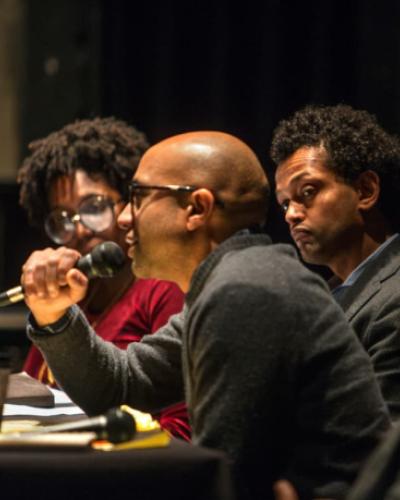“The history of the Negro is the history of America, and it is not a pretty story,” says the late writer James Baldwin in director Raoul Peck’s documentary “I Am Not Your Negro.”
The 2016 film is based on Baldwin’s recollections of the civil rights leaders Medgar Evers, Malcolm X and Martin Luther King Jr. A friend, intimate and comrade of all three, Baldwin explores race relations in America before, during and after their assassinations. His words connect race relations in the 20th century with those today as depicted by the film. In the words of Samantha Sheppard, assistant professor of performing and media arts, “he reminds us history is the present.”
Following a screening of the movie on Feb. 8 at Cornell Cinema, the first of the “Skin” series hosted with with the Society for the Humanities, four College of Arts and Sciences professors gave brief talks before engaging in a Q&A with the audience.
Pointing the audience’s attention to Black History Month, Kevin Gaines, the W.E.B. Du Bois Professor of Africana Studies and History, noted how “representations of Black History Month tend to be triumphalist stories of progress, of how far we’ve come.” He described the film as “an important corrective to that.”
“The civil rights movement was also a time of tragedy and violence,” he said. According to Gaines, Peck’s film also “picked up extensively on Baldwin's writing about the role of film in brainwashing Americans, not just white, but black,” in reproducing myths and ideologies of white supremacy and black inferiority.
Russell Rickford, associate professor of history, said Baldwin “realized how deeply invested we Americans are in mythology of America.” Baldwin “understood if America were to be salvaged, it wouldn’t be fulfilment of some inherent democratic creed, but that it would require transformation, transformation of our political economy, and first of all our culture.”
Noting the high attendance for the film’s screening but a corresponding lack of attendance in a “demonstration against the targeting of Muslims” in the United States, he argued that “privileged audiences tend to relish exposure of their own ugliness and violence.”
“Americanness is blindness,” Rickford said, concluding, “this moment of self-recognition before is the recognition of our own bigotry and violence,” but “that moment of self-recognition is not a cure of blindness.”
Commenting on the film’s unorthodox nature, Dagmawi Woubshet, associate professor of English, praised “how it uses exclusively Baldwin’s voice.” Because “it isn’t diffused, we are able to glean a portrait of the artist through his own writing.”
However, Woubshet critiqued the film’s obliqueness with regard to Baldwin’s sexuality. Although Baldwin was “among the first writers to broach the question of queer sexuality,” the film only mentioned this through “one reference by the FBI, introduced almost as alleged information.” According to Woubshet, “this evasion was curious at best, and disingenuous at worst.” Instead, he suggested, “you could use Baldwin’s complex life to reflect on our own complicated identities.”
Sheppard said the audience had witnessed “amazing cinema,” citing the film’s “power” through its use of Baldwin’s text. To sum up the film, she borrowed a Baldwin quotation: “The paradox of education is precisely this – that as one begins to become conscious, one begins to examine the society in which he is being educated.”





